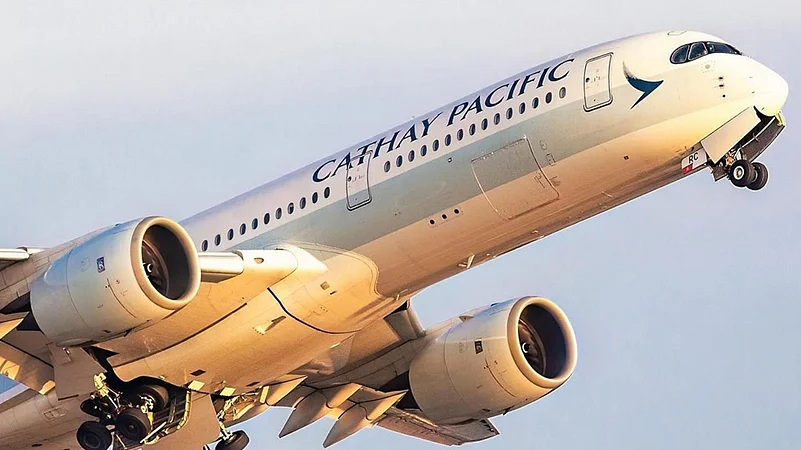Hong Kong’s airline Cathay Pacific, recently announced it had to cancel some flights due to engine problems with its Airbus A350 planes. As a result, the company is checking all of them as a precaution.
Following the incident, the European Union Aviation Safety Agency said in a statement that it is closely monitoring the situation. “We will be monitoring any information coming out of the technical investigation and taking decisions for any fleet-level action as required,” an EASA spokesperson reportedly said.
The announcement for the same was made by the company on September 2 after an issue popped up with its flight to Zurich after the company discovered an engine component failure on its A350 aircraft. The engine is made by British manufacturer Rolls-Royce. Forty-eight flights have already been cancelled by the airlines due to this issue. Before diving any further, let’s understand what the issue is about.
Where did it start?
While the exact issue has not been specified by the company, Cathay Pacific reportedly mentioned in a statement that it “identified a number of the same engine components that need to be replaced". The issue started after several minutes of takeoff on CX383 that was going from Hong Kong to Zurich, as per reports.
As per Reuters, the A350-1000, which is a five-year-old plane, dumped fuel on the sea and circled two times. Eventually, it returned to Hong Kong 75 minutes after its departure and landed safely.
Meanwhile, while not going into the specifics of the issue, Cathay Pacific mentioned that this was “the first of its type to suffer such failure on any A350 aircraft worldwide".
The airline said in a statement that they have identified several engine components that need to be replaced, secured spare parts and begun repair work.
What does it mean for customers?
With the checking work going on for the engines, the airline mentioned that a number of aircraft will be out of service for several days while this process is being completed. The inspection is expected to be completed by today, September 3.
Currently, flights between Hong Kong and Sydney, Osaka, Tokyo, Taipei, Bangkok and Singapore will continue operating through the end of Wednesday, September 4.
Meanwhile, customers have already complained about poor services from the airline. As per South China Morning Post, traveller were informed about the cancellation late on Monday at around 9:30 pm. Following this, many panicked as they had to make last-minute travel arrangements. Speaking to the Post, a traveller said, "The email provided no alternatives and we were left waiting on the hotline for over an hour.”
Reliability of the Rolls-Royce Engine?
British multinational aerospace and defense company Rolls-Royce is interestingly the only company that makes engines for the Airbus A350, which comes in two sizes: the Airbus 350-900 and the Airbus 350-1000. As per reports, there are around 88 A350-1000 jets that are operating world-wide.
However, it is not known yet if other airlines that are using similar engines are also inspecting their airlines. Some of the airlines with similar engines include Qatar Airways, British Airways, Virgin Atlantic, Etihad Airways and Japan Airlines.
Following the incident, Rolls-Royce said in a statement, “Rolls-Royce notes the airline’s statements that it has launched a precautionary inspection of its fleet and also that, to the extent that any components need replacing, spare parts have been secured and the replacement can be completed whilst the engine is on-wing.”
Rolls-Royce faced criticism for its A350-1000 earlier from Emirates. Concerns about the durability of the engine were voiced by Emirates president Tim Clark. The engine was declared defective by Clark in November 2023. He also mentioned that between maintenance visits, the aircraft's engine could only spend 25 percent of the time "on wing," as per reports. However, Rolls-Royce defended its A350-1000 engine after the criticism, but at the same time acknowledged that the engine has scope for improvement.
As per Reuters, Ewen McDonald, Chief Customs Officer at Rolls Royce, said, "The engine works really well in what we call benign operations... But in sandy, hot conditions it is challenged, as all modern engines are, because the temperatures are very high. We see it across the industry."
































